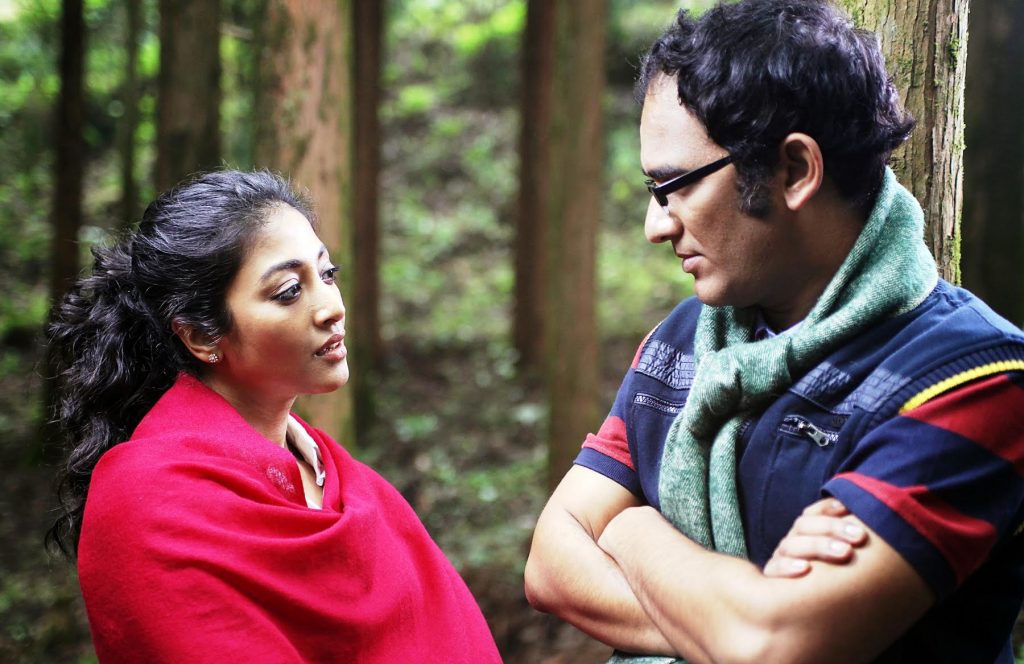Asamapta is an adaptation of a novel called Aschorjo Bhromon (Strange Journey) by Shirsendu Mukhopadhyay. Asamapta means ‘incomplete” or “unfinished”, which defines the bottom line of this relationship film about the journey the hero, Indrajit (Ritwick Chakraborty), embarks on up to the hills to find some definite meaning to his life.
Since he directed his first full-length feature film, the National Award winning Herbert, in 2005, theater person-turned-filmmaker Suman Mukhopadhyay has journeyed through extremely polarized and even conflicting literary sources. He made a trilogy of films adapted from Nabarun Bhattacharya’s novels – Herbert, Mahanagar@Kolkata (2010) and Kangal Malshat (2013). Kangal Malshat faced serious censor trouble before it could be released with some cuts. But the film was a commercial disaster because the story, the characters, the treatment and even the language the dialogues were delivered in went right over the heads of the audience. Before Kangal Malshat, Mukhopadhyay ventured into Tagore with Chaturanga (2008) and than Tagore’s much debated discourse on love with Shesher Kabita (2015.) For the first time, he takes up a novel by Shirsendu Mukhopadhyay, one of the most popular novelists among contemporary filmmakers within Bengali cinema. Taking a holistic view of his cinema, it is challenging to find a definite pattern in his work. In other words, the auteur signature is missing. Yet, from the subtle layers of the cinematic space he explores and analyses, the common strand that emerges, including Kangal Malshat, is his angst around man-woman relationships within and without marriage. Asamapta is a cinematic and narrative extension of this angst in a contemporized setting.
Shot entirely on location in the picturesque hills of Lava wandering around Rishihola-Kolakham-Delo-and Zuluk (the Silk Route), the narrative takes the film to a different dimension altogether, throwing up a slice of humanity distanced from the mainstream and yet close to it in a different way. For once, Asamapta proves how technical brilliance can enrich a film that is somewhat limited in its relationship paradigm and in this area, one must compliment the mastery of cinematographer Gopi Bhagat for the way he handles the magic of people moving from the deep mist into the lightening fog and then to the relative brightness of day. The interior shots of Professor Moloy’s house with its knick-knacks and the much-debated mosquito net with its powerful associations in a husband-wife relationship, the crane shots of the serpentine roads running down to the mainland, the clambering, rocky terrains of the hillscape and the blue skies dotted with cotton candy clouds evolve into a strong character in the film. The backdrop and the locale posits the people residing in this world where at some invisible point, illusion blends into reality, the reality of a beautiful woman who can love and care turns into a metaphor for all men at all times.
Indrajit, the protagonist of the film, who actually becomes a sort of anchor for the main story, introduces the audience to a hero, who is not only a coward who runs away from relationships – literally, but also has multiple health issues such as a tooth that has gone bad, a tendency to catch a cold come what may, and an aversion to the bottle despite the shivering cold of the setting he has arrived in. Ritwick Charkaborty slips fluidly into this moral coward of a man who wants to belong but lacks to guts to commit himself and is as good as he normally is. His cynical friend, Moloy (Bratya Basu), is an alcoholic who drinks for all hours of the day, fights tooth-and-nail with his exquisitely beautiful wife, Tuki (Swastika Chatterjee). Tuki loves male attention irrespective of age or position and admits that she loves the warm touch of a man. Moloy and Tuki are characters with several layers that prove that appearances can be more deceptive than we think they are. Both Basu and Swastika give excellent performances. Swastika’s winter wardrobe seems a bit too extravagant in terms of the place she lives in.
The problem lies in the sub-plot of the other family of Mitul, her husband Subrata and his beautiful sister Sanatani. The characters, other than that of Sanatani, an outstanding debut by Poulami Das, are not fleshed out as much as the others including the intriguing Pawan Singh alias Chelu (Dibyendu Bhattacharya) who once again proves what a great actor he is. Paoli as Mitul has been vested with a very harsh, heavily made-up look which partly intrudes into her performance while Anindya Banerjee as her husband who loves to capture his wife in every pose through his expensive lenses, is wasted in a weakly defined role. Shantu Mukherjee in the brief cameo of a dentist who can recognize patients only when they open their mouth is very good.
The film has no songs and Debajyoti Misra’s low-key music on the sound track is meaningfully dotted with the sounds (Sukanta Majumdar) of the natural surroundings –the chirp of the mountain birds, the humming of insects, the sound of water running down the flowing streams over pebbles and rocks, the sounds of crashing window panes when stones are thrown at them, the loud arguments breaking into fights between Moloy and Tuki flesh out the physical, environmental and social reality the film is soaked in. Sourav Sarangi’s editing fulfills the demand of the slow-moving script justified by the beautiful surroundings of the hilly regions where nothing exciting seems to happen and even fights between couples get frozen in the chill of the surroundings,
But does Indrajit finally find himself? For the answer, you have to watch the film. All said and done, Suman has made a very different and enjoyable film though one might not be able to stomach the logic of happy marriages the story spells out in different ways. But then, you just have to fall back on that clichéd phrase of cinema being a wilful suspension of disbelief.
Bengali, Drama, Color
https://www.youtube.com/watch?v=uYueWaO4zfU


